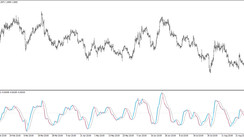The Stature of Pound Sterling in Forex Trading
The Pound Sterling (GBP), being the primary currency of the United Kingdom, is among the most sought-after currencies in the forex exchange market. Its prestige not only comes from the UK's rich financial history but also due to its standing as the oldest currency actively traded in the forex market. The strategic location of London, a significant global forex hub, further enhances the pound's popularity.
For most individuals embarking on forex trading, the GBP often stands out as one of the initial currency choices. It's especially attractive for traders keen on fundamentals - relying on economic reports and news events - as understanding the critical factors influencing the GBP can enhance their trading efficiency and sharpen their focus.
This article aims to highlight key economic indicators beneficial for novice traders, setting a foundation for more detailed exploration and research.
Key Insights for GBP Trading
As the fourth most traded global currency, the Pound Sterling remains a pivotal focus for forex traders given its crucial role within one of the world's largest economies. Therefore, understanding what drives its value is vital for successful forex trading.
Fundamental traders, who rely on information gleaned from economic reports and news events, regard specific economic and financial reports released by the UK as vital. These reports encompass five primary areas: 1) price and inflation, 2) monetary policy, 3) confidence and sentiment, 4) GDP/economic growth, and 5) the balance of payments.
Core Factors Influencing Currencies
It's imperative to realize that global currencies are commonly influenced by the same underlying economic parameters. Monetary policy, price inflation, confidence and sentiment, economic growth (GDP), and the balance of payments are the primary factors affecting currency values.
With these factors as a foundation, it becomes feasible to identify the most relevant reports that can shape a comprehensive perspective of a currency's direction.
Focus on Prices and Inflation
Key Reports: CPI, PPI
Price and inflation are vital elements affecting GBP's value. Countries experiencing high inflation rates compared to others usually see their currency value depreciating against those other currencies. Moreover, inflation often prompts central banks to implement countermeasures like adjusting interest rates to mitigate its undesirable effects.
To keep tabs on the UK's inflation, traders commonly track the Consumer Price Index (CPI), formulated and released by the Office for National Statistics. The CPI measures the change in consumer goods and services prices over a period. This report is particularly important as the Bank of England (BOE) uses it for its inflation target. Any CPI changes straying from the BOE's inflation target may indicate impending monetary policy actions, potentially affecting GBP significantly.
Moreover, while consumer prices drive most inflation level changes, measures like the Producer's Price Index (PPI) are also relevant. Many view the PPI as an early inflation indicator, highlighting inflationary changes at the raw material level, which may eventually reach the consumer level as seen in the CPI. Given that the PPI report is typically released before the CPI, they should be evaluated together for a comprehensive picture.
Did You Know?
The UK holds the sixth position in the global economy in terms of GDP as of 2023.
The Role of Monetary Policy
Key Reports: Bank Rate, BOE Inflation Report
Monetary policy, set by the Bank of England (BOE), is another critical factor to consider. Promoting monetary stability - characterized by low inflation and currency confidence - is one of the BOE's key mandates.
Should the BOE perceive inflation levels threatening the pound's stability, they will utilize monetary policy tools to control inflation. The timing of these policies, like interest rate changes, is what traders seek to anticipate.
Traders typically track changes in the bank rate, the interest rate for interbank balances held at the BOE, to stay updated on monetary policy. The Monetary Policy Committee (MPC) sets these rate decisions monthly, available on the Bank of England website.
Importance of Confidence and Sentiment
Key Report: Gfk Consumer Confidence
Surveys that assess market sentiment serve as another crucial tool for fundamental traders. Confidence and sentiment reports in the UK are important as traders need to understand the public's economic outlook – whether it's predominantly optimistic or pessimistic. Changes in sentiment and their magnitude can signal underlying economic trends, leading to potential shifts in GBP.
Many traders track UK sentiment via the Gfk Consumer Confidence report. The Gfk survey encapsulates respondents' attitudes towards past and anticipated future events over a 12-month period, providing a sentiment gauge for the UK's economic direction.
Assessing GDP/Economic Growth
Key Reports: Manufacturing and Production, Index of Services, Retail Sales, GDP
The general level of economic activity in the UK significantly influences currency values. The Gross Domestic Product (GDP) is the chief measure of economic activity in the UK, similar to many other countries.
Traders should be aware of three different GDP reports – Preliminary GDP, Revised GDP, and Final GDP. The Preliminary GDP estimate, released first, carries the most impact as it offers traders the first insight into the UK's economic health. However, it is the least accurate and often revised in the subsequent Revised GDP and Final GDP reports.
Since GDP is a quarterly report, traders supplement it with more frequent economic activity indicators such as retail sales, manufacturing and production, and the index of services. Retail sales, given consumers' role as key economic activity drivers, are usually assigned greater importance.
Understanding Balance of Payments
Key Reports: International Trade, Balance of Payments
The balance of payments (BoP) reflects a country's transactions with the rest of the world. Though the BoP comprises three accounts, forex traders generally focus on the current account.
The current account details a country's import and export activity, income and transfer payment flows. A current account surplus generally benefits the currency as it indicates more capital flowing into the currency than exiting, and a deficit is negative for the opposite reasons.
The trade balance report, focusing on import/export data, is released monthly, while the current account is released quarterly.
Interesting Currency Facts
The Kuwaiti dinar holds the title of the world's strongest currency, with the Iranian real as the weakest. Kuwait's robust economy, bolstered by its vast natural resources primarily oil, supports its strong currency. Conversely, Iran's economy, hit by sanctions due to its backing of organizations labeled as terrorist organizations by the U.S., has led to the weakening of its currency.
Major Contributors to the UK's GDP
In the UK, the services sector is the most significant contributor to GDP, accounting for 82% of output in 2021. As of April 2023, service sector output increased by 0.3%.
The Foundation of the British Pound
The British pound isn't backed by any physical asset, such as gold. Like most modern currencies, it's a fiat currency, with its value determined by market supply and demand.
Final Thoughts
Several economic indicators can influence the pound. The first step is knowing which reports to use. The challenging part involves interpreting and combining these reports to derive a trading direction. But if you're a beginner looking to base your GBP trades on fundamental reports, starting with these five key areas would be a prudent move.





